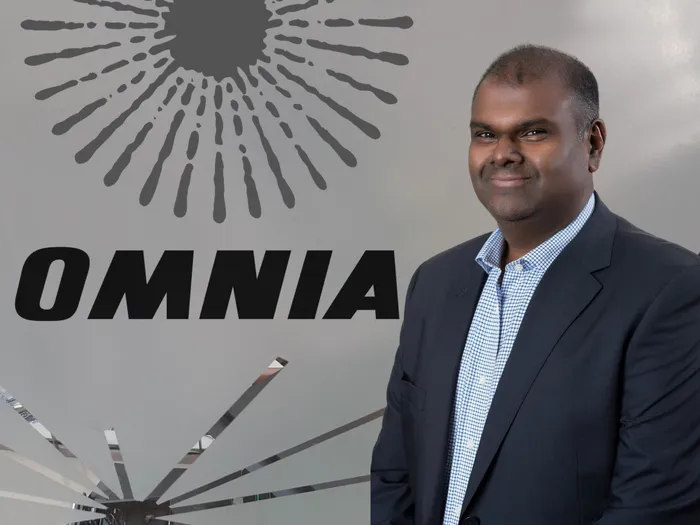
Seelan Gobalsamy, CEO of Omnia Holdings.
Image: Supplied
Omnia Holdings’ mining explosives division, one of two core operations in the group, has continued to report robust profitability in spite of significant investments in the development of businesses in Canada and Australia, CEO Seelan Gobalsamy said Monday.
The division reported 3% growth in revenue to R4.84 billion in the six months to September 30, 2025, while operating profit increased by 7% to R570 million. The operating profit margin increased by 4% to 11.8%.
Gobalsamy said in an interview both the Canada and Australian operations were in development phase, while the business in Indonesia was performing well. He noted that the detonator plant in Canada had been commissioned but was not yet contributing to revenue, while they also plan to establish a hydrogen peroxide emulsion plant. This plant had been built in Stockholm and would be settled in Canada over 12 months.
He stated that the mining division had reported a compound annual growth rate in profit of 41% over the past five years and he anticipated this trend would continue.
During the interim period, the mining segment had delivered a strong performance, benefiting from higher volumes and enhanced cost efficiencies, despite lower activity from the diamond sector.
The margin increased despite the impact of a currency translation movement on its Zambian operations, following the strengthening of the Kwacha. Strong operational performance was maintained in West Africa.
In the six-month period, group revenue increased to R11.2bn. Group operating profit grew by 12% to R900m. Headline earnings per share increased by 11% to 320 cents.
Higher volumes across the agriculture and mining segments, supported by the group’s integrated manufacturing and supply chain, also successfully overcame the impact of an extended ammonia supplier shutdown.
In the agriculture segment, revenue increased by 11% to R5.66bn, while operating profit increased by 9% to R458m.
Gobalsamy said this represented a resilient performance considering the impacts of adverse climatic conditions in certain international markets, currency volatility, and growing global trade uncertainty.
Strong sales volumes in South Africa, supported by favourable agronomic conditions and pricing, along with a recovery in the Rest of Africa, contributed to the segment's performance.
Gobalsamy anticipated that the favourable agronomic conditions in South Africa would continue into the second half. Agricultural conditions in Zambia and Zimbabwe were normalising.
During the first half, demand was balanced across segments to ensure uninterrupted security of supply to customers, driving higher sales volumes and enhancing margins.
Gobalsamy mentioned that the group used a planned 60-day plant shutdown of certain chemicals by Sasol to do maintenance and upgrades at some of its own systems. While some profit was lost from the shutdown, the process was managed so that no customers were left without product.
The strategy to grow the distribution footprint in the USAand Brazil was gaining momentum, driven by demand for sustainable farming solutions and high-quality products.
The chemicals segment’s restructuring plan was executed. The water care business remained profitable and was being held for sale, he said. The release of capital in the restructured chemicals segment positively contributed to the improved cash conversion cycle, a factor likely to continue into the second half, he added.
"Our strong financial position and disciplined capital management enables us to create sustainable growth opportunities that will strengthen our global presence and grow our core businesses," said Gobalsamy.
BUSINESS REPORT